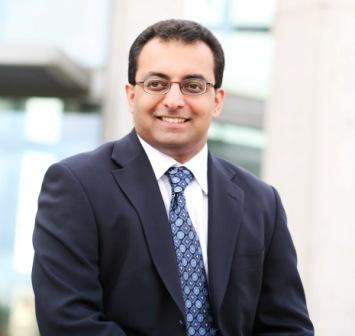Your articles
 Deepak Dave (MSc Banking and International Finance 2001)
Deepak Dave (MSc Banking and International Finance 2001)
Bringing sophisticated finance to Africa
My first day at City University Business School started inauspiciously as I, along with most of my course mates, struggled to find our first class. But I soon learned how to negotiate the obstacle course that was the Barbican campus, and quickly discovered that I was on a great course.
Consequently, Cass gave me an understanding of quantitative finance, bank management, history of financial crises, macro-economics and financial flows. All taught by world-renowned professors who helped me understand the complex interplay of forces on the lifeblood of the modern economy.
Alongside me, my classmates came from a broad swathe of countries. They taught me about everything from Russian politics and Greek football to the nuanced differences between Vietnamese and Cambodian cuisine. Working on projects, competing in class and discovering a city as vibrant as London together remains a treasured memory. It’s great to learn that the Alumni office is now making it easier for us to contact each other and catch-up on a decade worth of news!
A great strength of our school is that being in the City, we have access to some of the best opportunities possible on the career ladder. I was lucky enough to have tremendous support in finding a role at Barclays Capital, where I worked on global multinational credit risk followed by derivatives risk. Those statistics courses really came in useful as they enabled me to work out complex algorithms and at least pretend to grapple with the advanced math that became part of City life in the noughties.
Later at Barclays I was tasked to set up the structuring and risk management function for an innovative strand of businesses targeting financial institutions in Africa and the Middle East. Derivatives, loans, sovereign debt, structured trade and commodity finance all formed part of our repertoire, and this was in the early noughties when African finance was not as well developed as it is today.
It was a grueling but exhilarating task and my network of academic support from alumni and staff at Cass was invaluable. Some of the adventures during this period raise a laugh now, including meetings with central bank governors, oil and mining barons, some deeply religious arms salesmen, shady customs officials and, most joyously, the stoic, ever-optimistic entrepreneurs in a tough place to do business.
Following this I worked independently with a few private equity fund managers and investment banks focused on Africa. My primary contracts were related to setting up risk management teams when a bank was being set-up or bought out, and alongside this I developed a fund focused on subordinated debt investments.
However, by 2007 it was time to return to Canada, where I joined a specialist government-backed lender focused on emerging markets. We provided senior, mezzanine and equity financing for clients in energy, financial services, mining, resources, real estate and telecoms across Latin America, East Asia, India and the Middle East.
Back in Ottawa I also started to write articles for a business magazine based in East Africa, ratio-magazine.com, as well as joining the board of a local community health centre, a community loan fund, and my city council’s Business Advisory Committee. My experiences in Africa have also created opportunities to speak on television and at conferences with regard to how the financial sector can contribute to international development.
It’s been fun and I’ve learned so much. African finance still faces many challenges and I hope Cass will be at the forefront of examining and solving them.
One challenge is to increase flows of capital to Africa. A more sophisticated financial sector will be needed to improve efficiency and efficacy of the capital allocation mechanism. Such a sector will need firm underpinnings both tangible (stock depositories, property registries, arbitration tribunals and courts) and intangible (rule of law, standardized contracts, institutionalizing payment systems).
Another challenge is to explore the use of deeper and more high-quality capital structures in a part of the world used to mostly equity and unsophisticated debt.
Also necessary is the improvement of governance through enhanced transparency and decision-making particularly regarding corruption. And the use of financial products we take for granted to reduce the volatility of prices (commodity derivatives, interest rate and currency protection) remain nascent, and should be explored in more depth.
I have had the great fortune of studying at a truly international school of Business at Cass, and I remain confident that forthcoming groups of graduates will continue to make us all proud of being alumni of the school and the city of London.